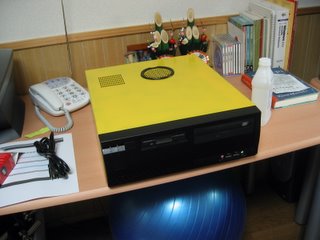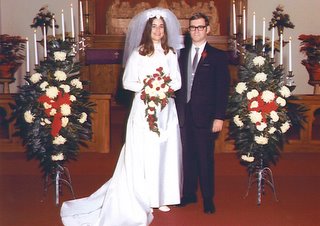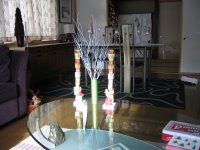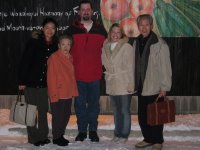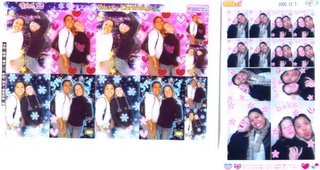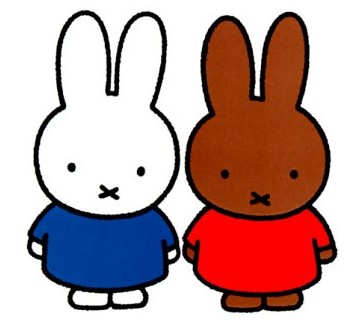While Chris and I celebrate Christmas Western-Style (with some irreverence, as demonstrated by my
creche), the Japanese celebrate it -how else? Japanese style.
Japanese-style means Christmas is a secular, rather commerical holiday (like Valentine's Day). This makes sense when you realize that less than 1% of the Japanese population is Christian. The major religions here are
Shintoism and
Buddhism. Rather than one or the other, most Japanese are both, as Buddhist rites are used for things like funerals and Shinto rites for things like births, weddings, and blessing cars and construction sites (seriously). A Japanese friend summed it up like this: Buddhism=sad things, Shintoism=happy things.
Because it is an imported holiday, Christmas, as done by the Japanese and seen through Western eyes, is not quite right (same with American food done Japanese style, or fashion...you get the idea). Some people take offense at the Japanese version of Christmas, mostly because it is strictly commericial. I don't have a problem with it at all, it's actually refreshing compared to the weird its-commericial-now-but-we-will-pay-lip-service-to-the-religious-aspect-thing going on Stateside. Don't get me wrong, I have a tremendous respect for those that observe it as a true religous holiday, it just so happens that the Japanese don't.
Since it's not a religious event, the emphasis in a Japanese Christmas is on fun for families with small children or romance for couples.
Some funny Japanese Christmas "traditions":
Families will get a bucket of KFC chicken for dinner as the "traditional holiday meal", a absolutely stunning
marketing move using perceived cultural gaps on the part of KFC. Folks, the Japanese really do believe
everyone in America traditionally has KFC for Christmas Dinner.
Dessert, in the form of a Christmas
Keki (cake) follows the bucket of KFC. A Japanese friend asked me about Christmas Keki and was shocked when I replied that the keki is a Japanese Christmas thing, and most assuredly not American (in the Trautman household it wasn't cake. It was booze and lots of it, my friend seemed to appreciate the concept of havin lots to drink, though). Chris and I did get a keki last year and it was very good-a light sponge cake with fresh whipped cream and strawberries, although we could have have chosen from chocolate, chocolate buttercream or a fruit tart-type affair. We will probably pick up our Christmas Keki today while we are out and about.
There are lights. Oh man, there are lights. The Nipponese are all about the Xmas lights. And tinsel. Good Lord, give unto us anything sparkly/shiny/covered in glitter. The Japanese seem to have managed to extract the essence of a totally tacky 1960's Xmas and run with that. But its so innocent and lacking in irony that you can only shake your head and plug your ears, as they like musical lights, too.
There's a lot of red decorations (red is a rucky color in Japan and other asian countries). Gold is abundant (also rucky) as well as pinks, purples, blues. Not too much green and I noticed very little white, probably because white is associated with Buddhist funeral rites (the only two times a Japanese person would wear all-white is when they are a bride and when they are a corpse). I imagine the concept of "White Christmas" would send a shudder down the spine of the Buddhists.
There are Christmas Trees--small ones, and artificial-there's no market for real trees here, except for on base, where the trees are bought exclusively by Americans. I broke down last year and bought artificial, after Nic warned me that when he bought a live tree, all the needles came off a week before Christmas Day and he and Lue ended up buying a fake one anyway.
This morning, I spent a good fifteen minutes looking out the window and laughing my ass off as my across-the-street-Japanese-neighbors tried to figure out how to put together their Xmas tree. So much for goodwill towards your fellow men, huh? I wasn't malicous, though. It was geniunely entertaining. I'm sure they will get a laugh in a few days, when I will probably fall off the ladder whilst trying to hang up my
shimenawa. Anyway, my neighbor put the tree together outside and then discovered it wouldn't fit through the door! I think my young newlywed neighbor ended up having an argument with his father-in-law about it, too.
There are presents given, although they aren't necessarily placed under the tree. Presents are given to children, from "Santa". Kids do not give presents to parents and once the kids are older and don't believe in Santa-san, there are no more presents. This doesn't mean that my Japanese friends aren't tickled when I give them a Christmas gift-everyone likes presents. However, because of the cultural sense of
giri (a loose translation is obligation), I have to be careful what I give-otherwise you get on what I call the
giri-go-round (I gave you a gift, so now you have to give me one that is of equal or greater value and so on and so on). The Japanese really don't get the idea of "gift" in its truest sense.
If you are a young couple, instead of a young family, Christmas is a romantic holiday (unless your in-laws are over and you're arguing about your artificial Xmas tree) even more so than Valentine's Day (which is also slightly "off" as observed by the Japanese). Dinners at fancy resturants, engagement rings or other fancy presents are de rigeur. Apparently if you don't take your best girl to the best restaurant on Christmas...you'll probably be spending New Years alone!
There's also a unkind saying, stemming from Japanese Christmas tradition, in which an unmarried woman over 25 years of age is referred to as "Christmas Cake". Cake shops throughout Japan always try to sell all their Christmas cakes before Christmas eve. Any cakes left after Christmas are seen to be stale, out of date, no good because they're not "fresh". This is getting less funny though, as the average age when Japanese get married is slowly creeping up. But still, it's mean, because they're 25 for crying out loud, not 75.
And finally, unlike the states, where New Year's is secular,
New Years in Japan is a religious holiday, important to both Shintoists and Buddhists. It is a time for close friends and family and "nesting." In preparation for the new year, the house is thoroughly cleaned, special New Year cards are mailed and families cook and eat special dishes, for good luck, health and longevity through the next year. Most places close down between the 23rd of December and the 1st of January. For the Buddhists, at midnight on Dec. 31st, the temple bells toll 108 times, to purge the mankind of the 108
bonnou (evil passions) that plague it and start the new year off clean and fresh. I tried to stay up to listen last year, but I fell asleep. I'm sure the Japanese equivalent of "sloth" is part of that list of 108. Shintoists stay up all night to pray and to observe the first sunrise of the new year, obviously, I don't.






